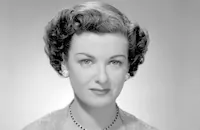Curtiz and Bogart picked We're No Angels (1955), a story of three escaped convicts from Devil's Island, that was based on the French play La Cuisine des Anges by Albert Husson. An atypical outing for both Bogart and Curtiz, We're No Angels begins with the prison escapees planning to rob and murder husband and wife shopkeepers. However, they quickly reason that "cutting their throats might spoil their Christmas," so the men decide instead to get the financially unstable store back on track by fixing the place up and bringing in more customers. As business begins to boom, Andre Trochard, the owner of the store, arrives on the scene with some greedy schemes of his own. Throw in a deadly snake named Adolph (one of the convict's pet), and the fun begins.
Bogart plays Joseph, ringleader of the convicts. He is joined by Peter Ustinov as Jules and Aldo Ray rounds out the group as Albert, the snake's owner. Ustinov had just completed The Egyptian (1954), also directed by Curtiz, and both men were looking forward to working together again. On the set, Ustinov and Bogart would become good friends as well, although Humphrey was prone to childish pranks like putting raw liver in his colleague's shoes, something Peter understandably did not find hilarious. Although Ustinov remembers filming fondly, he was rapidly tiring of Hollywood, comparing it to "a gigantic World's Fair they haven't had time to tear down."
The fastidious Curtiz was also a target for Bogart's amusement, falling for fake dog poop in his trailer. Sophomoric hijinks aside, however, Curtiz sought to further diversify his repertoire by tackling the comedy genre with We're No Angels and for the most part, he succeeds; Ustinov's impeccable comic timing flourishes under his direction and even Bogey's sneer softens to a smile. Basil Rathbone plays the sinister storeowner with glee, a delightful parody of the villain roles he performed prior to his Sherlock Holmes typecasting. And Joan Bennett is particularly memorable as the kindly shopkeeper wife. Bennett, best known as Spencer Tracy's wife in Father of the Bride (1950), had been away from the screen for almost three years after being embroiled in a scandal that effectively blackballed her from Hollywood. In 1951 her husband, producer Walter Wanger shot her lover and agent Jennings Lang in a jealous rage. When the smoke (literally) cleared, Bennett was painted as the antagonist in the lover's triangle and quickly shunned by film society. Bogart, a long-time friend, came through for his fallen colleague with the role in We're No Angels.
Many of Curtiz's films share a common theme, that of outsiders in an unknown environment. The convicts in We're No Angels are certainly in unchartered territory, but the premise also shares real-life parallels with some of the cast and crew. For Curtiz, it was an attempt to try something different within the rigid formula world of Warner Brothers. For Bogart, it was a break from the rough, hardened characters he previously played and a chance to have fun. And for Bennett, it was a cherished opportunity to participate once again in her chosen profession.
Producer: Pat Duggan
Director: Michael Curtiz
Screenplay: Ranald MacDougall
Production Design: Sam Comer, Grace Gregory
Cinematography: Loyal Griggs
Costume Design: Mary Grant
Film Editing: Arthur P. Schmidt
Original Music: Frederick Hollander
Principal Cast: Humphrey Bogart (Joseph), Aldo Ray (Albert), Peter Ustinov (Jules), Joan Bennett (Amelie Ducotel), Basil Rathbone (Andre Trochard), Leo G. Carroll (Felix Ducotel), Gloria Talbott (Isabelle Ducotel).
C-106m. Closed captioning.
by Eleanor Quin

























